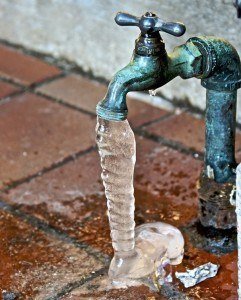Prepare for Winter Frozen Pipes
Prepare for Winter Frozen Pipes

Seattle is known for harsh winters. While some enjoy the cold air, one thing nobody likes for sure is frozen pipes. When water freezes inside a pipe, the frozen water causes it to expand, thus increasing the risk of it rupturing.
Burst pipes can lead to a flood and result in costly damage. With this in mind, it would behoove of homeowners to take the necessary precautions to prevent their pipes from turning into icicles come winter time.
Pipes Vulnerable to Freezing
Pipes are located all over the home, including under the ground and inside the walls. Some pipes are more prone to freezing due to their location. This includes those situated in the following areas:
- Inside exterior walls
- Outside and adjacent to the exterior wall
- Exposed pipes in unheated areas of the home
Protecting Pipes Outside the Home
Exterior pipes are usually where you connect your garden hose to. Be sure to disconnect and drain the hose as winter approaches. A hose left outside and connected to the pipes will have accumulated water inside. If it freezes from the inside, the entire hose will expand and increase the pressure in the entire plumbing system.
Aside from the hose, also be sure to switch off the interior shut-off valve and drain the spigot. It also helps to install a faucet insulator and refit your pipes with a frost-proof spigot.
Exposed Interior Plumbing
Exposed pipes in the basement are relatively safe since they’re located in a heated area of the home. However, those in sections like the attic, garage, and crawl space are vulnerable and should be winterized. Protect these pipes by wrapping them in foam pipe insulation.
You can also cover them with thermostatic-controlled heat tape, which will release heat when the pipes dip below a certain temperature.
In place of insulation wrap, you can also opt for the following alternatives:
- Foam board – instead of encasing the pipes in wrap, create a barricade around the entire system with foam board. The board can be easily cut and held in place with wood framing and coarse-thread drywall screws.
- Heating cable – You can also prevent frozen pipes with a heating cable. This usually comes in the form of a kit that can be pieced together into a heat trace cable with an electrical plug on one end and the other end insulated and safely terminated.
- Space heater – for a temporary solution, you can simply place a portable heater next to the exposed pipes.

Under-Insulated Walls
Pipes routed inside exterior walls can also freeze due to improper insulation or installation. Unfortunately, since these pipes are located behind the walls and out of reach, you will need to open the wall in order to beef up the insulation. This situation is best left to a contractor.
Once a portion of the wall is cut open and the pipes are out in the open, they can be reinforced with insulation or rerouted.
Going Away for the Winter?
If your home is going to be uninhabited for the winter, then preventive measures must be taken before you leave to avoid frozen pipes upon your return. Before walking out the door, be sure to shut off the main water supply line.
Also open all the faucets in the home to completely drain them. You should also keep the furnace running in your absence; set it to no lower than 55 degrees.
Unfreezing a Pipe
If a pipe has already frozen over, no need to fear. The problem can be remedied quite easily provided that you have direct access to the pipe. To thaw a pipe, switch on a hair dryer and blow it over the surface for a few minutes.
Alternatively, you can also submerge a towel in hot water and then wrap it around the pipe. Whichever method you use, make sure the faucet is turned on so the water can leak out as it’s thawed.
Keeping the Pipes Warm and Cozy
Burst pipes can cost an arm and a leg in needless and preventable repairs. If you’re not a savvy DIYer and would rather leave the job to an expert, contact Fischer Sewer to have a professional technician reinforce your pipes for the winter. As you probably know from experience, winters in Seattle can be unforgiving.
Don’t let your plumbing take a hit when cold weather strikes.
